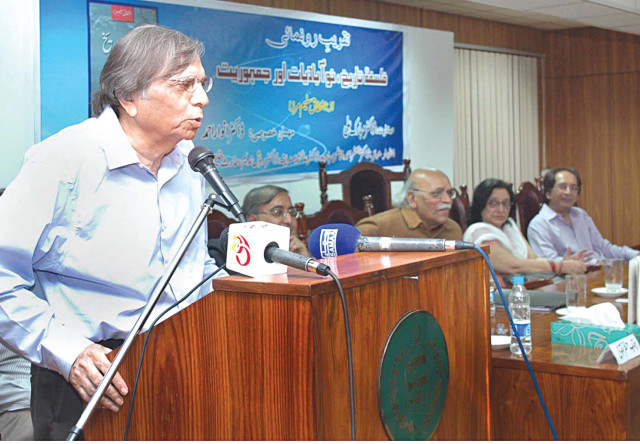Creation and consolidation: Desire for new identity led to Pakistan ideology
Pakistan attached no glamour to the local civilisation.

Historian Dr Mubarak Ali. PHOTO: APP
“The early leaders of Pakistan had realised that it could not carve its niche in the comity of nations in India’ shadow. Therefore, they aimed their efforts at making the new country different from its neighbour,” said historian Dr Mubarak Ali on Tuesday.
He was speaking on Identity and ideology, on the second day of international conference on Pakistan: Creation and Consolidation. The event has been organised at the Forman Christian College.
“Since its creation in 1947, Pakistan has been in search of a separate identity and legitimacy in order to distinguish itself from India. Compared to India it was at a disadvantage because it adopted a new name which was unfamiliar to most of the world,” Ali said.
Ali said since its creation Pakistan had attached no glamour or romance to the local civilisation and culture as India had. To get recognition, it needed to build an identity different from India, he said.
“The desire to emphasise separateness led to the construction of an Islamic identity which emphasised Two Nation Theory, the raison d’etre of the creation of Pakistan.”
At the same time, he said, an effort was made to give an exclusive character to the areas now comprising Pakistan. He said to de-link this area from the Indian sub-continent, a theory was propounded that the area had historically remained separate.
Therefore, he said, its geography justified West Pakistan’s independence.
“There was a problem of adjusting East Pakistan in this theory. It, however, became irrelevant when in 1971 Bangladesh became an independent country and West Pakistan became Pakistan.”

Beaconhouse National University School of Education Dean Tariq Rahman said, “The Pakistani state began with a dual, and conflicting vision of national identity. One set of discourses originating from modernity and the imperative of creating a modern state desired the dominance of the nationalists’ identity.”
Rahman’s paper, Language, Modernity and Identity, said gender was reduced to the binary opposition of biological male and female eliminating all inter-sexual and pre-modern identities. It also turned a blind eye to the existence of class-based identities seeing them either in economic and statistical terms or not at all, he said.
He said it also reduced the religious identity to the single category of Muslim and non-Muslims as ‘other’.
Sarah Ansari, a history professor at the University of London, said it could be argued that politics in Sindh in the years following independence and partition had been all about numbers.
In her paper The Politics of Numbers: 1947 to 1958 she explored ‘numerical’ anxieties usually in relation to people and about other things as well-underpinned much contemporary debate regarding Sindh’s place in the newly constructed Pakistan.
Professor Willem van Schendel from the University of Amsterdam, said, “Today, it is hard to imagine that for a quarter of a century most Pakistanis were Bengali.”
“The war of 1971 produced a mutual blindness: as Pakistan shrank to its western wing and eradicated memories of united Pakistan, Bangladesh did the same.”
Dr Yaqub Khan Bangash of Forman Christian College presented his paper titled Uneasy Pakistanis: Balochistan’s Relationship with Pakistan, 1947-1958.
Professor Osama Siddique, Professor Ilhan Niaz, Ishtiaq Ahmed and Ayesha Siddiqa presented their papers at a discussion on Institutional Troika: Civil-military-Judiciary.
The conference concluded with the discussion on The Economics of the Economy in which Professor Imran Ali, Shahid Jaed Burki, Professor Akmal Hussain and Dr Rashid Amjad presented their papers.
Published in The Express Tribune, April 16th, 2014.



















COMMENTS
Comments are moderated and generally will be posted if they are on-topic and not abusive.
For more information, please see our Comments FAQ